
55 Orchard Street, New York, New York 10002 212 989 5467 fax 212 989 5642
 55 Orchard Street, New York, New York 10002 212 989 5467 fax 212 989 5642 |
Laura Sharp Wilson |
|||||||
|
Interconnected abstract and naturalistic forms weave, tug, bind and undulate throughout Laura Sharp Wilsonís detailed paintings in her fourth solo exhibition with the gallery. She combines intricate patterns, flattened areas of color and fantastical botanic forms to emphasize the tension between confusion and clarity. Her idiosyncratic compositions address both intimate personal details of her life and universal social and environmental concerns. Wilson creates her sharply rendered acrylic paintings on Japanese paper mounted to wood panels. The fibrous texture of the paper becomes a visual element upon which she layers shapes and motifs inspired by abstraction, textile design, knot formations, and the natural world. Wilson cites influences ranging from 18th-century Indian bed-curtains and the Constructivist textile designs of Varvara Stepanova to the work of Keith Haring, Yayoi Kusama, and Chris Ofili. Using components of her visual language, Wilson incrementally builds each painting until a wonderful density is reached. The space within the work is both complex and compressed. In front of curiously colored backgrounds and obsessively minute patterns, segmented stalks support patterned bulbs in the midst of wild coiling vines and looping barbs. The completed works reflect the inherent tensions among her influences: abstraction represents nothing, yet encompasses everything; nature has been disempowered, yet always overcomes; strands and fibers can be tangled, but also clearly ordered. The subjects of Wilsonís paintings come variously from her personal history, her inner processes, and humanityís relationship with the natural world. Copper, a painting with striated tassel forms suspended among rocky outcrops, represents the Rio Tinto Bingham Mine. This open pit mine is the largest in the world and prominently visible in the Salt Lake valley, near where Wilson has lived for several years. The centrally radiating composition of Lou Mandala with Cady Underneath was originally inspired by the target paintings of Kenneth Noland, but transformed into an ode to the recently-deceased Lou Reed. In Stew, Fuss and Whine Assembly Line, the artist expresses her own personal tendency to obsessively mull over lifeís minutiae, while in The Most Radical Thing You Can Do, Wilson celebrates the slow, methodical, but generous activity of complex art making. | |||||||
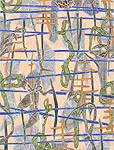 Wormwood Pattern, 2014 Acrylic and graphite on Unryu paper mounted on wood 12 x 9 inches |
 Laced Tower, 2014 Acrylic and graphite on Unryu paper mounted on wood 23 3/4 x 7 1/4 inches |
 Installation view |
 Installation view |
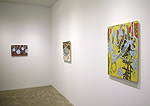 Installation view |
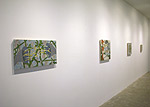 Installation view |
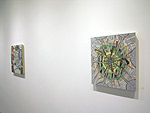 Installation view |
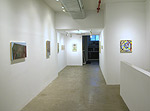 Installation view |
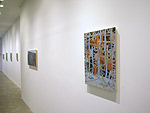 Installation view |
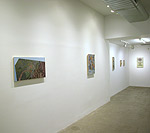 Installation view |
 Installation view |
 Installation view |
55 Orchard Street, New York, New York 10002 212 989 5467 fax 212 989 5642
email info@mckenziefineart.com |